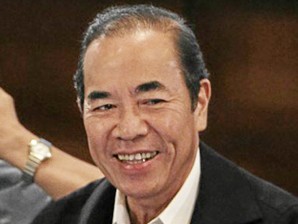Transparency helped DPWH save P10.6B—report

Department of Public Works and Highways secretary Rogelio Singson. INQUIRER FILE PHOTO/LYN RILLON
MANILA, Philippines—The Department of Public Works and Highways has made good on its promise of “full transparency in operations” with regular updates on government infrastructure projects, as well as public disclosures of project irregularities involving agency personnel.
In a report, a copy of which was furnished the Philippine Daily Inquirer, the DPWH noted that “reformed public works processes have resulted in the elimination of wastes and the curbing of corruption, a more prudent and objective selection of projects and the strict adherence to the policy requiring the preparation of work programs with detailed estimates for each capital outlay instead of indiscriminate releasing of funds.”
It disclosed that “at least P10.6 billion has been saved by the DPWH through transparent and competitive bidding of projects.”
“From the 2012 budget, the department had saved P3 billion (as of June 30, 2012) through competitive and transparent bidding of projects in addition to P6.1 billion savings from the 2011 budget from locally funded projects and P1.5 billion from foreign-assisted projects,” the report said.
According to the DPWH, “these savings can now be utilized for additional infrastructure projects, like funding the site development for the relocation of the victims of tropical storm ‘Sendong’ in Region 10.”
DPWH Secretary Rogelio Singson has asked his regional and district engineers to “be transparent in the conduct of biddings” in their respective areas.
He reminded them that “biddings should be competitive…. There should be no collusion, no favors, no riggings and no negotiated contracts.”
“Any DPWH official found to have colluded with contractors in the bidding and awarding of contracts shall be dealt with accordingly. No more business as usual in DPWH,” Singson warned.
Singson pointed out that in full transparent biddings, the DPWH “can achieve more than 20 percent in savings from budgetary allocations.”
Operating in what it called “daylight mode,” the department has simplified its bidding process “from more than 20 documentary requirements to only five.”
Bidding documents can also be downloaded from the DPWH website (www.dpwh.gov.ph).
The agency also reported that “road projects are now being implemented according to approved plans and specifications by better-equipped and qualified contractors with close project inspection and monitoring by a network of civil society organizations and Church-based groups,” among others.
The DPWH “has a convergence program with the Department of Tourism to provide good road access to priority tourist destinations nationwide under the DOT [Department of Tourism] Master Plan.”
“During the past two years, a total of P4.4 billion has been allocated for tourism-related road infrastructure projects. This year, an additional P5 billion from agency savings plus another P12 billion next year will also go to the same projects,” the DPWH said.
It also reported that “three Skyway projects—the Ninoy Aquino International Airport Expressway, the North Luzon Expressway and South Luzon Expressway Link Connector Road and the Metro Manila Skyway Stage 3—will create an integrated elevated road network for Metro Manila.”
“This skyway network will be President Aquino’s legacy project,” said the DPWH.
The agency noted that “after institutional reforms and changes in bidding procedures were instituted in 2011, 2,374, or 94 percent, of 2,515 infrastructure projects have already been bid out.”
“Out of the 2,374 projects, a total of 2,313 projects have been given notices to proceed. In addition, we have already obligated P105 billion, or 65 percent, of the total allotment of P162 billion for 2012, and an actual disbursement of P64 billion compared to only P26 billion for the same period in 2011,” it said.
During the second half of 2010 alone, the department said it was able to save P577 million with the elimination of negotiated contracts,
Singson has expressed confidence they could save more public funds “as we institutionalize reforms in the bidding process and also pursue the DPWH transformation program.”
In the same report, the DPWH said full transparency in operations also means public disclosures of project irregularities involving agency personnel.
It cited, among others, “bidding irregularities in DPWH Region 4-B, where the District Engineering Office in Mamburao, Occidental Mindoro, began a project worth P300 million, which was well beyond the P50 million that district engineers can sign off on their own.”
“Bypassing both the central and regional offices, they cut the project into components that would not breach the said limit. The DPWH promptly canceled the bidding of these projects, clustered them into six projects and rebid them in September 2011. Implementation is ongoing under close monitoring by the DPWH central office. A new district engineer was assigned in Mamburao,” it said.
At the DPWH headquarters in Manila, the agency “has been operating a Complaints and Action Center (call center 165-02) to address queries and complaints,” said Elizabeth Pilorin, chief of the department’s public information division.
“We’ve also tapped social media, like Facebook and Text 2920 plus e-mail, in getting feedback from the public,” Ms. Pilorin said.
According to Pilorin, “the department has accredited at least 49 civil society organizations for the close monitoring of government projects.”
Early this year, the DPWH entered into a memorandum of understanding (MOU) for transparency and accountability with several non-government groups like Bantay Lansangan and Cost Phil, the Commission on Audit and the Ombudsman.
The MOU aims to “reinforce the department’s transformation framework of full transparency and accountability in doing the right projects at the right cost and top quality and accomplished right on time,” according to Singson.
Aside from focusing on transparency, efficient fund utilization and improving efficiency, Singson has repeatedly stressed the need to “change the department’s organization culture to restore public trust in DPWH.”